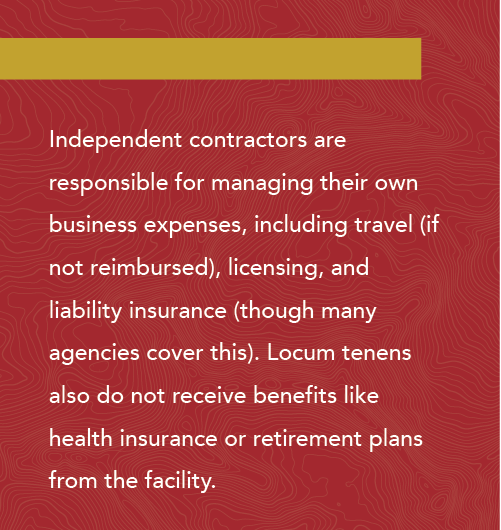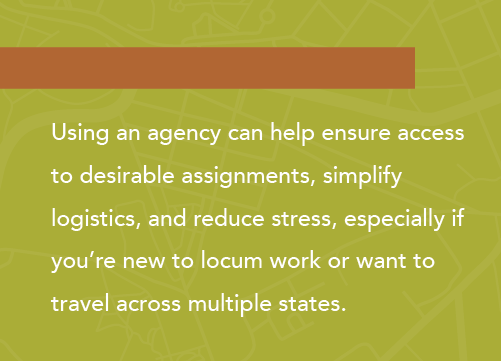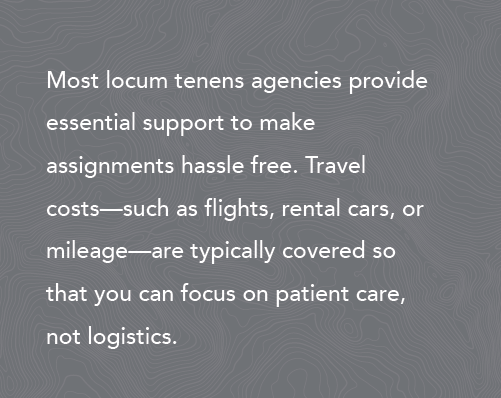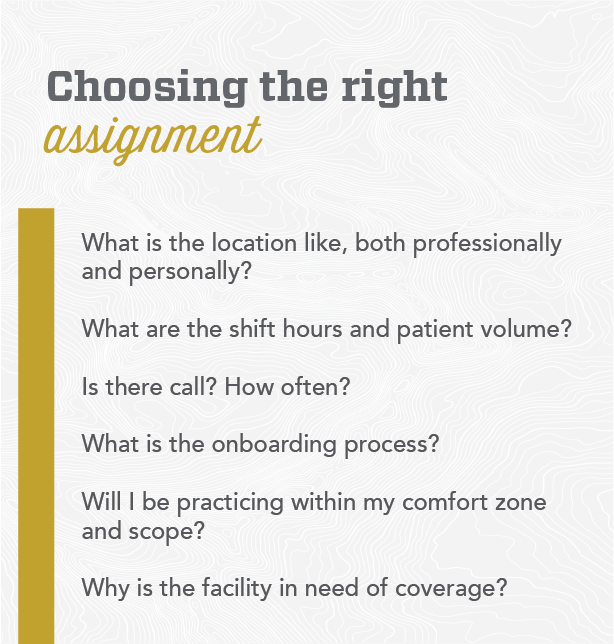Locum tenens 101: A physician’s guide to locums in the U.S.
August 07, 2025
For physicians looking for flexibility, variety, or a new way to practice medicine, locum tenens offers an appealing path. Whether you're just starting, transitioning between roles, or ready to scale back your hours, this career option can help you meet your professional and personal goals.
In this guide, we break down the basics of working domestic locum tenens to help you understand how it works, what to expect, and how to get started. Hear from experienced locum tenens physicians about how they’ve used this career path to explore new practice settings, achieve better work-life balance, and take more control over their schedules and income.
What is locum tenens?
"Locum tenens" is a Latin phrase meaning "to hold the place of." In medicine, it refers to physicians who fill temporary roles at healthcare facilities. These assignments can last anywhere from a few days to several months and may involve travel to another city or state, or, if travel isn’t tenable, there are local locums opportunities.
Why physicians choose locum tenens
Physicians use locum tenens in many ways throughout their careers:
As a full-time career: Some physicians work exclusively as locums, enjoying the ability to travel, avoid administrative burdens, and focus on patient care.
To supplement income: Some pick up locum shifts on weekends or during vacation to boost earnings.
Between jobs: Locums can be an excellent option for bridging gaps between permanent roles.
Post-residency: Before committing to an employment contract, many new attending physicians use locums to explore different practice settings and locations.
Transition to retirement: Seasoned physicians often work part-time locums as they retire from full-time roles.
Dr. Andrew Wilner, author of The Locum Life: A Physician’s Guide to Locum Tenens, offers insight into how locum tenens is a viable alternative for physicians at any stage of their career: newly graduated, mid-career, and late-career.

“I consider myself to be in the late-career physician category. At this stage of my career, I feel I’m able to preserve my physician identity by working locums if I decide to leave my full-time academic position.”
In addition to career flexibility, locum tenens can offer a better work-life balance. Without the administrative responsibilities of a employed physician, many doctors feel they can focus more on patient care as well as find time for themselves, their families, and their interests.
Just out of training? Why you should work locum tenens right out of residency
Understanding the independent contractor role
Most locum tenens physicians work as independent contractors, not W-2 employees. This means you control when and where you work. It also means you are responsible for managing your own business expenses, including travel (if not reimbursed), licensing, and liability insurance (though many agencies cover this). Locum tenens also do not receive benefits like health insurance or retirement plans from the facility.

As an independent contractor, you're responsible for self-employment taxes, quarterly estimated tax payments, and tracking deductions. You may be able to deduct expenses like licensing fees, CME costs, travel, and housing.
Consider working with a tax professional who understands physician finances and locum tenens specifically to ensure compliance and maximize your deductions.
How does locum tenens pay work?
Locum tenens physicians are usually paid an hourly or daily rate, with compensation varying based on specialty, location, urgency, and shift type. Rural or hard-to-fill assignments often offer higher pay, and roles with nights, weekends, or call duties may come with additional incentives.
Because you’re an independent contractor, you’re paid directly for your work hours or days. This makes it easier to calculate your income and compare potential assignments. It also gives you control—you can increase your earnings by working more shifts or choosing higher-paying roles.

Keep in mind that your pay is negotiated for each assignment, so it's important to work with a recruiter or agency that can advocate for a competitive rate that reflects your skills, experience, and market demand.
Should you use a locum tenens agency?
You can work directly with facilities to arrange assignments, but many physicians partner with a locum tenens agency for the ease and support. Agencies typically help with everything from credentialing and licensing to travel, housing arrangements, assignment negotiation, and contracting.

Using an agency can help ensure access to desirable assignments, simplify logistics, and reduce stress, especially if you’re new to locums work or want to travel across multiple states.
Emergency medicine physician Dr. Rip Patel recommends working with a locum tenens agency instead of trying to do it solo. “They make sure that everything is set up on time, such as travel and housing arrangements. This way you’ll be all set before you start your first shift.”
Curious about what locums housing is like? Learn all about where you stay on a locums assignment
How to choose a locum tenens agency

When evaluating locum tenens agency options, it’s important to find a partner that understands your needs and supports your goals, both clinically and personally. A strong agency should offer clear communication and a personalized approach to help you make the most of each assignment. Key factors to consider include:
Transparency: Are they transparent about pay, location, and expectations?
Support: Do they offer licensing and credentialing help?
Reputation: Look for agencies with strong physician reviews and long-standing healthcare partnerships.
Personalization: A good recruiter should take time to understand your goals and preferences.
Working with a recruiter who genuinely advocates for you can make a big difference in your experience.
Family physician Dr. Elizabeth Dayton worked with GMS for two locum tenens assignments in New Zealand. In between those international assignments, she had a family medical situation and needed to stay close to home. GMS found her a locums assignment that fit the bill.
“I have worked with the same recruiters for my assignments, and I have gotten to know them, and they are so good,” she says. “I feel like I know my GMS recruiters well, and they’re extremely helpful.”
Global Medical has a unique advantage over other locums agencies: we staff for both domestic and international assignments, so if you're planning an international assignment, we can find you an assignment closer to home while you're waiting for visas and international licensing to go through.
“One big advantage of working with one company is that whenever you take a new assignment, there’s a lot of credentialing, and there’s so much paperwork and hassle that goes into it," says Dr. Dayton. "Because I work with GMS for both international and domestic assignments, that takes a lot of that off my plate. Anytime you establish with a new company you’ve got to provide so much information, and it takes a lot of time. If you’re switching locum tenens jobs frequently, that can be cumbersome.”
What’s included with locum tenens work?

Most locum tenens agencies provide essential support to make assignments hassle-free.
Travel
Travel costs—such as flights, rental cars, or mileage—are typically covered so that you can focus on patient care, not logistics.
Housing
Housing is also arranged and paid for by the agency, whether it’s a hotel, extended stay, or furnished apartment close to the facility. Some physicians prefer to receive a stipend and coordinate their own housing, especially for longer assignments, while others prefer to have it handled by the agency. Agencies often have established partnerships and may be able to find more convenient or cost-effective options than you could on your own.
Malpractice
Medical malpractice insurance is typically included as well, often with tail coverage. These benefits are negotiated upfront, so be sure to confirm what’s covered before accepting an assignment.
Get more answers about what's included: Locum tenens FAQs
How to choose the right assignment
Not all locum tenens assignments are created equal, and choosing the right one can make the difference between a rewarding experience and a frustrating one. With so much variety in practice settings, patient populations, schedules, and locations, finding an assignment that aligns with your professional goals and personal preferences is important. Whether you're seeking a fast-paced hospital environment or a slower rural clinic, asking the right questions upfront helps ensure a good fit.

When evaluating an assignment, important questions to consider include:
What is the location like, both professionally and personally?
What are the shift hours and patient volume?
Is there call? How often?
What is the onboarding process?
Will I be practicing within my comfort zone and scope?
Why is the facility in need of coverage?
“My favorite question is why the facility needs a locum provider in the first place,” says locums pediatrician Dr. Trevor Cabrera. “If it’s for a simple maternity/paternity leave or a staff member who has transitioned to another job for a personal reason, I’m less dissuaded. I am very wary if there is a history of running through one provider after another.”

Family medicine physician Dr. Alison Liewen seeks out rural locum tenens assignments, including a recent assignment in Alaska. She enjoys the challenges and opportunities of being the only physician in these remote locations: “As a family physician, being in small towns gives you the chance to practice a much greater variety of medicine because you’re the one doctor in town.”
Ultimately, the right assignment should support your lifestyle, suit your clinical strengths, and offer a work environment where you can succeed. Taking time to evaluate the details can set you up for a positive and productive experience.
Starting your locums journey
Locum tenens can be an advantageous way to practice medicine. It offers flexibility, variety, and the chance to explore new places while making a meaningful impact on patients’ lives. Whether you’re considering a short-term stint or a long-term lifestyle shift, understanding the basics of domestic locum tenens is the first step toward making it work for you.
Ready to choose your locum tenens adventure? Give us a call at 1.800.760.3174 or view today’s job opportunities.

